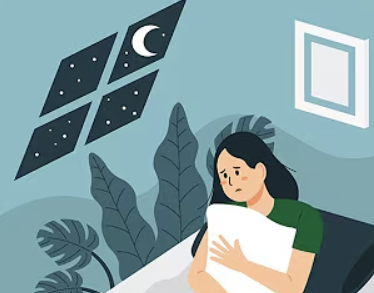Shocking truth: The nightly routine that may be destroying your health, revealed by a naturopathic expert!
- Replies 0
Disclaimer: The information provided in this article is for educational purposes only and is not intended as a substitute for professional medical advice, diagnosis, or treatment. Always consult your physician or other qualified healthcare providers with any questions you may have regarding a medical condition or before making any changes to your health regimen.
It’s a ritual many of us hardly question—winding down the day with a little television, a late-night snack, or some scrolling through our phones.
But what if those seemingly innocent habits were quietly taking a toll on our health?
According to a naturopathic expert, one common nighttime behavior could be undermining your well-being in ways you’ve never imagined.
If you’ve ever stayed up past 11 p.m., you might want to rethink your routine—because your body may be paying the price.
Dr. Janine Bowring, a naturopathic doctor with over one million followers, is warning against the health risks of staying up too late.
Her message is simple but serious: going to bed after 11 p.m. could be quietly damaging your physical and mental health.
This habit, she says, interferes with your body’s natural release of melatonin, the hormone responsible for regulating your sleep cycle.

Known as the “hormone of darkness,” melatonin is produced by the pineal gland and plays a critical role in helping us fall—and stay—asleep.
Our bodies are designed to follow a rhythm—what scientists call the circadian clock.
Exposure to natural light in the morning helps trigger alertness, while darkness at night signals that it’s time to rest.
But late nights, bright screens, and artificial lighting can confuse this internal clock, leading to poor-quality sleep and disrupted hormone balance.
Dr. Bowring stresses the importance of stepping outside each morning to soak in natural light and creating a dark, calm environment in the evening.
These small adjustments can help your body produce melatonin naturally—no supplements needed.
Despite their popularity, Dr. Bowring recommends skipping over-the-counter melatonin supplements.
While they may provide short-term relief, she believes relying on them can interfere with your body’s ability to produce the hormone on its own.
Instead, she advises building consistent bedtime habits, respecting the natural light-dark cycle, and limiting exposure to devices at night.
The National Heart, Lung, and Blood Institute supports this approach, recommending adults aim for 7–9 hours of sleep.
Getting too little—or even too much—can have long-term health consequences, including weakened immunity, hormonal imbalance, and cognitive decline.
Dr. Bowring suggests several lifestyle changes that can improve not just sleep, but overall health:

Have you noticed how your sleep affects your mood or energy? What are your go-to tips for winding down at night? Share your thoughts and experiences in the comments below—we’d love to hear how you’re reclaiming your nights and protecting your health.
Read more:
It’s a ritual many of us hardly question—winding down the day with a little television, a late-night snack, or some scrolling through our phones.
But what if those seemingly innocent habits were quietly taking a toll on our health?
According to a naturopathic expert, one common nighttime behavior could be undermining your well-being in ways you’ve never imagined.
If you’ve ever stayed up past 11 p.m., you might want to rethink your routine—because your body may be paying the price.
Dr. Janine Bowring, a naturopathic doctor with over one million followers, is warning against the health risks of staying up too late.
Her message is simple but serious: going to bed after 11 p.m. could be quietly damaging your physical and mental health.
This habit, she says, interferes with your body’s natural release of melatonin, the hormone responsible for regulating your sleep cycle.

Dr. Janine Bowring, a naturopathic doctor, is warning against the health risks of staying up too late. Image source: The Knowledge Project Podcast / YouTube
Known as the “hormone of darkness,” melatonin is produced by the pineal gland and plays a critical role in helping us fall—and stay—asleep.
Our bodies are designed to follow a rhythm—what scientists call the circadian clock.
Exposure to natural light in the morning helps trigger alertness, while darkness at night signals that it’s time to rest.
But late nights, bright screens, and artificial lighting can confuse this internal clock, leading to poor-quality sleep and disrupted hormone balance.
Dr. Bowring stresses the importance of stepping outside each morning to soak in natural light and creating a dark, calm environment in the evening.
These small adjustments can help your body produce melatonin naturally—no supplements needed.
Despite their popularity, Dr. Bowring recommends skipping over-the-counter melatonin supplements.
While they may provide short-term relief, she believes relying on them can interfere with your body’s ability to produce the hormone on its own.
Instead, she advises building consistent bedtime habits, respecting the natural light-dark cycle, and limiting exposure to devices at night.
The National Heart, Lung, and Blood Institute supports this approach, recommending adults aim for 7–9 hours of sleep.
Getting too little—or even too much—can have long-term health consequences, including weakened immunity, hormonal imbalance, and cognitive decline.
Dr. Bowring suggests several lifestyle changes that can improve not just sleep, but overall health:
- Limit EMF exposure by keeping phones and electronic devices out of the bedroom.
- Use blue-light blocking glasses and avoid screens before bed.
- Spend more time outdoors, especially in the morning.
- Prioritize gut health with fiber-rich foods and natural environments that support your microbiome.
Key Takeaways
- Staying up past 11 pm is discouraged by Dr. Janine Bowring, a naturopathic doctor, as it can affect the proper release of melatonin and disrupt your circadian rhythm.
- Dr. Bowring advises against taking melatonin supplements, as the body naturally produces melatonin when exposed to natural light in the morning and darkness after sunset.
- The National Heart, Lung, and Blood Institute suggests adults should aim for seven to nine hours of sleep per night for better health.
- The naturopathic doctor also recommends reducing EMF exposure, limiting blue light toxicity, spending more time outdoors for natural light exposure, and prioritizing gut health to improve overall well-being and hormone balance.
Read more:
Last edited:






